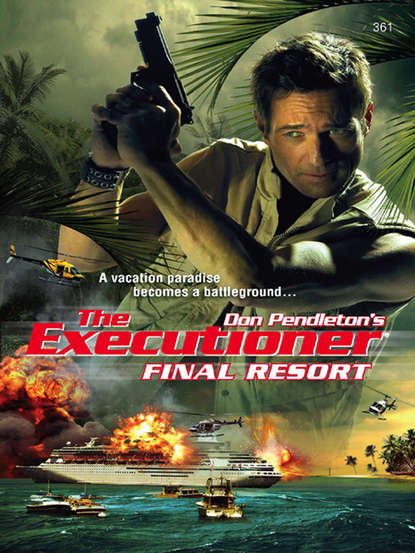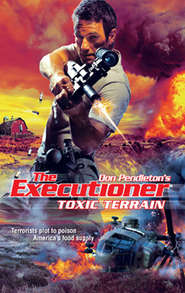По всем вопросам обращайтесь на: info@litportal.ru
(©) 2003-2025.
✖
Final Resort
Автор
Год написания книги
2019
Настройки чтения
Размер шрифта
Высота строк
Поля
Under other circumstances, Bolan might have appreciated the scenery passing below the Bell JetRanger, but part of his mind was on board the Tropic Princess with her passengers and crew, the rest trying to work out where the other team of terrorists would strike.
Nine prisoners had broken out of Camp X-Ray, with an estimated six surviving raiders. Sohrab Caspari, speaking for the Tropic Princess hijackers, had demanded a chopper with seating for seven gunmen and an equal number of human shields. That left eight targets unaccounted for.
Where would they surface?
Were they still in Cuba? And if so, what worthwhile targets were available?
Brognola would be puzzling over that in Washington, together with the Pentagon, the CIA, the State Department—anyone, in fact, who could provide a hint of insight on the problem and anticipate the next move by their enemies.
He was too late to help the Tropic Princess, and it preyed on Bolan’s mind, but maybe he would be in time to stop the other team from acting out whatever bloody drama that its leaders planned.
The bad news was that Caspari’s team had already escaped from Cuba. If Asim Ben Muhunnad’s strike team had also fled the island, they might turn up anywhere. Each passing hour gave them greater range.
And if they surfaced somewhere outside Cuba, Bolan’s visit to the island would be a colossal waste of time. He would be sidelined once again, waiting for transport to the battle zone or relegated to a spectator’s position, while the action went ahead without him.
Eyes sweeping the horizon, he resigned himself to wait and see what happened next. He couldn’t force the confrontation, couldn’t read his adversary’s mind and force Muhunnad into some act ahead of schedule.
Bolan preferred proactive strategy, whenever possible, but in the present situation he could only bide his time, reacting to the moves made by his enemies. The best that he could do, in terms of preparation, was to stand in readiness and hope Muhunnad’s fugitive guerrillas chose a target close enough for Bolan to respond in a timely fashion, without placing any innocents in needless jeopardy.
“Another twenty minutes, sir,” his pilot said.
Bolan responded with a nod and focused on the journey still ahead.
Cuba
ASIM BEN MUHUNNAD WAS NOT accustomed to a life of luxury. But nothing in his wildest dreams had prepared him for Bahia Matanzas.
The five-star resort was located on the island’s northwest coast, an oasis of luxury in a country known for its rural poverty and urban decay.
The resort was a landmark on the road to restoration of Cuba’s crippled tourist industry. It offered Canadians, Britons and others a taste of tropic luxury not seen in Cuba since Batista’s time. The posh resort possessed a golf course and all the other amenities required to steal jet-setters from Aruba, Nassau, Martinique, Barbados, Montserrat, or Guadalupe.
The facility was close to full capacity. Its owners didn’t know that eight of the vacationers in residence were using stolen cash and credit cards, but meant to pay their final tab in blood.
Bahia Matanzas.
It pleased Muhunnad that the name, translated from Spanish to English, meant Massacre Bay.
CASPARI LITERALLY SAW the CH-60 Seahawk helicopter coming from a mile away. It showed up first on radar, gaining on the Tropic Princess from the northwest, presumably from a naval base in Florida. Caspari knew the aircraft had to be filled with television news reporters or a strike force of commandos sent to kill him.
When he saw its U.S. Navy markings with his own eyes, all doubt vanished.
By that time, he had issued orders via cell phone to his soldiers circulating through the ship. Farid Azima had not answered, a disturbing problem Caspari could not deal with at the moment, but the rest were at their stations, standing by to act upon his order.
When the Navy helicopter made its first pass overhead, Caspari had six passengers already standing on the cruise ship’s Sun Deck, situated below and in front of the bridge with its broad tinted windows. Daywa Gul-Bashra had collected them with offers of special tour, then showed his weapon to them when they reached the open deck. They were lined up near the railing, hands clasped atop their heads, some of them weeping as they faced the open sea nine stories down, Gul-Bashra just behind them with his submachine gun leveled at their backs.
Two women and four men. Caspari didn’t know them, didn’t care who any of them were or where they came from. They’d been picked at random, as examples for the infidels who had defied him.
“Reach out to the helicopter with your radio,” Caspari ordered. “Make contact at once.”
It took a moment, but a man’s voice issued from the speakers mounted around the bridge. “We hear you, people. Captain Ernest Ryan, here. Who am I talking to?”
“The man in charge,” Caspari answered. “Since you’ve been sent to intercept us, I assume that you’re aware of our demands.”
“I read the list,” Ryan replied.
“And you are now in violation of the ultimatum. Naturally there are penalties for your arrogance.”
“Hold on, now!” Ryan shouted.
“Can you see the people on the Sun Deck?”
“Yeah,” Ryan said. “I see them.”
“Watch and learn.”
Caspari keyed the cell phone, just a single ring, the arranged signal. Fifty feet beyond the bridge and twenty feet below it, Gul-Bashra sprayed his six targets with automatic fire, stitching them from left to right and back again before they fell. Four collapsed onto the deck, while two others pitched over the rail and fell toward the ocean far below.
Gul-Bashra wasted no time scuttling back to cover, while the helicopter hovered, angry faces pressed against its windows.
Captain Ryan raged, “Goddamn you, listen—”
“No! You listen,” Caspari snapped. “Six passengers are dead because you came here to attack us. Sixty more will die at once, if you attempt to board the ship. If one of you survives to set foot on the deck, I will sink the Tropic Princess. Are we clear?”
There was silence from the circling helicopter.
“Are we clear?” Caspari bellowed.
“We’re clear,” Ryan replied. “We’re backing off now.”
“Any tricks,” Caspari said, “and four thousand deaths are on your head.”
Washington, D.C.
“PERFECT,” NABI ULMALHAMA whispered to the empty room. The events unfolding on the television screen pleased him no end.
The only disappointment, so far, was a simple case of network censorship. Apparently there’d been at least one camera aboard the helicopter that had carried men and guns to liberate the Tropic Princess. It had captured the events on deck, and the resultant tape had found its way to CNN headquarters, but the editors in charge of on-air content had deleted footage of the sacrificial lambs as bullets ripped into their twitching bodies and the fell.
Never mind, Ulmalhama thought. In a few more hours, it would all be on the Internet for everyone to see worldwide.
Now that the first knee-jerk reflex had passed, now that the Pentagon had flexed its muscles and discovered it was powerless, he could begin to watch the clock again.
Two hours and fifteen minutes were left until the next round of bloodletting should begin. It would be dark over the ocean, or nearly so, but cruise ships were like giant office buildings, lighted day and night. He wondered whether any more helicopters would approach the Tropic Princess as the deadline neared.
He hoped so, hoped it would be broadcast live this time, with nothing spared. It would be educational for enemies of Allah to behold His work firsthand.
The telephone purred at his elbow. Ulmalhama muted the TV and lifted the receiver midway through its second ring. At once, he recognized the voice of his immediate superior at the Saudi consulate.
“Of course, sir,” Ulmalhama said. “I’m watching the reports now, as we speak…It’s terrible, I certainly agree…Sohrab Caspari? No, sir. He’s Iranian, my sources guarantee it…. Yes, by all means, he should tell the President that we are not involved in any way.”











